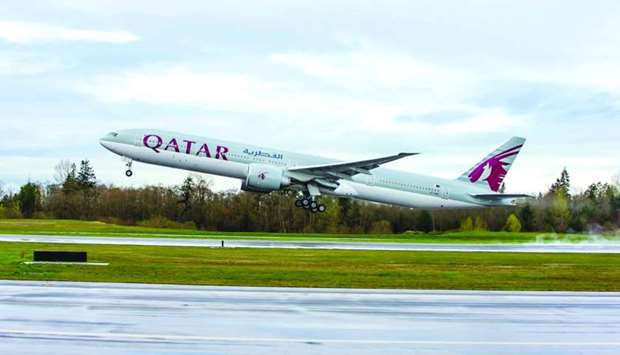Sydney: The world's largest aerospace company Boeing expects to deliver Qatar Airways newer generation 787s from 2019 and 777s from 2020, said Boeing’s senior vice-president (International Sales) Marty Bentrott.
“We are looking to start the delivery of 787-9 version to Qatar Airways from 2019. We are very excited about that,” Bentrott said in a recent interview with Gulf Times at the Sofitel Sydney Darling Harbour.
Qatar Airways today operates the largest fleet of 30 787s in the Middle East region, Bentrott pointed out.
“As of April this year, Qatar Airways has ordered 60 787s with us; this means there is a backlog of 30 more,” Bentrott said.
In relation to the 777s, the top Boeing executive said, “We have the new 777-9 coming down the line. This will be delivered to the airline, starting 2020.”
Including freighters, Qatar Airways has ordered (as of April 2018) 73 777s, data provided by Boeing showed.

As many as 63 have been delivered to Qatar Airways and there is a backlog of 10, of which three are freighters.
Bentrott said he understands that 20 of the 737 MAX Qatar Airways has ordered with Boeing will be used for Air Italy’s use.
“Recently, we delivered the first 737 MAX to Qatar Airways, which is going into service with their partner airline, Air Italy. The second 737 MAX will be delivered in the next few weeks. We are excited about that.”
In 2017, Qatar Airways acquired 49% of AQA Holding, the new parent company of Air Italy.
On Boeing’s business with Qatar Airways Cargo, Bentrott said, “Qatar Airways Cargo has grown rapidly and is already one of the world’s top cargo operators. Boeing has a strong presence in its cargo fleet.”
“Both the 747-8Fs ordered by Qatar Airways have been delivered. As many as 13 777 freighters have been delivered; three more are to be delivered,” Bentrott said.
“They are talking to us about the possibilities of (may be) a few additional ones. Cargo is a big part of the Qatar Airways business. Given the current situation in the region, cargo is ever more important,” Bentrott said.
On the possible impact of the expected rise in jet fuel prices, the Seattle-based senior Boeing official said, “Fuel prices are always a double-edged sword…because; they do impact the economics of our airlines, in terms of increasing operational costs. But then on the other side, they look for more fuel efficient newer airplanes to replace some of the less efficient ones. So yes, I think this could stimulate some additional interest in newer generation, fuel efficient aircraft such as 777-9s and 787-9s.”
In its report at the World Air Transport Summit (WATS) recently, the International Air Transport Association (IATA) said jet fuel prices are expected to jump nearly 26% this year and average $84 per barrel as IATA sees Brent Crude averaging $70 a barrel in 2018.
This is up from $54.9 in 2017 (+27.5%) and IATA’s previous 2018 expectation of $60 a barrel.
This year IATA forecasts the airlines fuel bill will rise to $188bn, which will represent 24.2% of average operating costs.
Fuel costs will account for 24.2% of total operating costs (up from a revised 21.4% in 2017), the IATA report showed.
On the fears of a global trade war between the United States and some of its allies including Canada, EU and Mexico, Bentrott said, “Our business is more global than it has ever been. When you have a friction globally, it could have an impact on us because of our huge exports.
“But we remain optimistic that things will get sorted out and that this will pass and things will be okay.”


